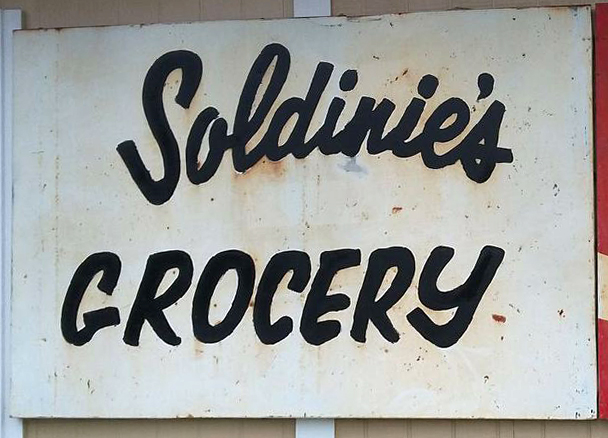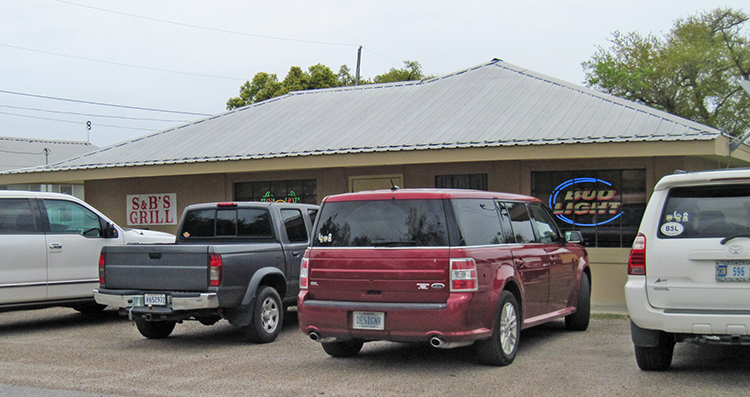Soldinie's Grocery - The Center of the Neighborhood
S&B's Bar & Grill on Sears Avenue is located in the original home of Soldinie's Grocery. Grandson Rick reminisces about growing up in an establishment that was the neighborhood's beating heart.
- by Becky Orfila
In 1942, William Turner Soldinie and his wife, Cora (Ladner) saved their egg money and part of Turner’s earnings as a carpenter to build and stock a small grocery store in the Fourth Ward. Located on the southeast corner of Sears Avenue and North Street, Soldinie Grocery served as a neighborhood gathering place beginning in the 1940s. Turner Soldinie built the store himself.
One of the Soldinies’ many grandchildren, Rick recalls spending summers with his grandparents. A graduate of St. Stanislaus College in Bay St. Louis, Rick would spend his summer days helping his grandparents in the store, observing the local personalities, and working in the neighborhood kids’ favorite place: the 6-cent snowball stand attached to the front of the store. The grocery was opened from seven in the morning until seven or eight p.m., depending on the number of customers inside. The fragrance inside the grocery was a mixture of fresh vegetables and bread, the smoke from King Edward cigars, and sweet treats. Gallon-sized glass jars of candy sat on the front counter with the cash register. Most customers charged their purchases. Rick recalls that the store sold Dixie and Falstaff beers, as advertised with neon signs in the front windows. It wasn’t unusual for customers to sit on old wooden beer boxes and drink cold beers inside the store, chatting about the day’s events and enjoying one another’s company. On occasion, local politicians would come inside, buy a round of beers, and ask for everyone’s vote in a coming election. A meat market where fresh meats were cut for sale in the store was situated in one room behind the main store area. Next to the meat room was a smaller room with a door that was perpetually closed. Inside, along one wall, were nickel slot machines. A small poker table was situated in the middle of the room. Frequently, a money poker game took place at the table — a practice frowned on by federal and local law enforcement at that time. According to Rick, the gambling room was no secret in the neighborhood. Behind the front counter were two small rooms: a bathroom and a closet. The closet door stayed closed to the general public and was only opened to fulfill the requests of special customers. Inside were shelves of liquor bottles that lined the walls. If a customer wanted a bottle of distilled beverage, Cora or Turner would disappear into the room, shut the door, and select a bottle from the selection available. They would return with the bottle in a brown paper bag. One summer day in the early 1960s, Cora was working the front counter when a man entered the store dressed in a business suit and tie. Business suits weren’t typically seen in the neighborhood, much less the Soldinie Grocery. The man inquired about liquor being sold out of the store. Rick watched as his grandmother protested the accusation by saying, “We ain’t got no whiskey!” The man continued to push the query. Cora, a diminutive force of nature confirmed again that the store did not store or sell liquor. Rick, a child of six or seven, spoke up to remind his grandmother, “Yeah, we do Maw-Maw . . . Paw-Paw keeps it in the closet!” Cora hushed the child with a stern “You be quiet, boy!”
Summertime brought visitors from New Orleans who stayed in homes built along the beach road. Relationships formed over the summer, and by the season’s end, the vacationers were stopping by the store to show off their fishing catch of the day and swapping stories about “the one that got away.”
The families in the neighborhood walked or drove to Soldinie Grocery. The Piazzas, Notos, Corrs, Ladners, Garcias (pronounced Gar-sha), Mayfields, Sauciers, Farves, Petersons, Bourgeoises, and Bordages (pronounced Bo-dash) formed the close knit community. Mostly skilled craftsman — carpenters, fishermen, welders — and an owner of a marina at Lakeshore lived and provided for their families in the neighborhood. Turner and Cora Soldinie are buried in Waveland Cemetery, down the road and across the railroad tracks at the intersection of five streets. The store was sold and currently houses the S&B’s Grill, but the locals recall the Soldinie Grocery with affection for the "good old days." Comments are closed.
|
Categories
All
Archives
July 2024
|
Shoofly Magazine Partners
Our Shoofly Partners are local businesses and organizations who share our mission to enrich community life in Bay St. Louis, Waveland, Diamondhead and Pass Christian. These are limited in number to maximize visibility. Email us now to become a Shoofly Partner!





























 RSS Feed
RSS Feed























